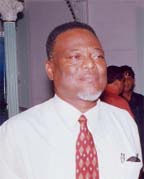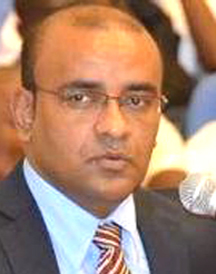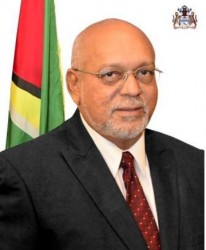Given the amount of pension received by former presidents monthly, benefits are not really necessary, according to Attorney General Basil Williams who said yesterday that the passage of legislation to cap these benefits was an attempt to correct the mischief done.

“…A former president gets 7/8 of the salary of the sitting president and it means that when the current president’s salary is looked at and you get 7/8 of that as a former president you are doing very well so you don’t even really need the benefits,” Williams told reporters at his office.
He told the media that the “mischief we are trying to correct and remedy is the mischief where you had an act giving benefits that were uncapped to former presidents and the worst nightmare of the populace was realized when one was confronted with the exorbitant amount of money that has been spent under the heading of benefits.”
Defending his government’s position on the issue, he stressed that Guyana is a poor county and that the benefits being given were untenable and as such the government decided to go to Parliament with the expressed understanding that “we are going to cap the benefits. You all know the figures that have been coming out and so we capped it.”
Williams said that as a result all former presidents will be affected by this capping. “You must note that President Granger is not a former president. The former presidents are the three existing former presidents [Bharrat Jagdeo, Donald Ramotar and Sam Hinds] and as a result of passing that legislation it is clear that the Minister of Finance would employ the caps.”

Responding to a question he made it clear that the reduction of certain benefits such as the $25,000 limit for electricity consumption, was not intended to degrade the former president. He insisted that the government’s view is that the pension being received was hefty enough and that added benefits would be a financial burden on the country.
The bill which was passed on July 9 has already been heavily criticized by former attorney general Anil Nandlall.
In a letter to the Stabroek News of July 2, Nandlall wrote: “More significantly, any attempt to utilize this Bill as an instrument to deny and deprive any or all of the aforementioned persons their entitlement under the 2009 Act, would be unlawful, unconstitutional, null, void and of no effect.”

He stated that under Article 222 of the Constitution salaries and allowances of the President “charged upon the Consolidated Fund signifies that they are not subject to the approval (or disapproval) of the National Assembly. It is but indicia of the level of protection and the security of tenure which the constitution accords to these office holders.”
The former Attorney General argued that Article 233 (3) specifically protects the salaries and allowances of the President and pension of the former presidents, “It is clear therefore, that while the remuneration package of these office holders can increase, no diminution is permitted even after they would have left office.”
Nandlall had argued that Clause 5 of the now assented to Act stated that a former president is not entitled to benefits and other facilities should he or she engage in business, trade or employment. He referred to the clause as unconstitutional noting that Article 149A says, “No person shall be hindered in the enjoyment of his or her right to work, that is to say, the right to free choice of employment.”
The enactment of the legislation was the culmination of an epic battle waged by APNU and the AFC against three separate administrations to slash what was deemed as unnecessary and unaffordable expenditure.
Under the Act, the allowances allocated for water, telephone and electricity were capped at $75,000 per month compared to the uncapped amount that averaged $370,000 a month for former Jagdeo. Additionally, the Act stipulates that all benefits and facilities granted are subject to taxation.
The Act does not affect the $1.4 million monthly pension that former presidents receive. However, under the new legislation household staff would be limited to three persons; security personnel limited to two persons; and clerical or technical staff limited to three persons who must not be engaged in any political work. The Act limits a former president to two vehicles to be owned and maintained by the State.









